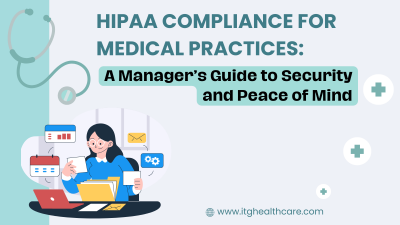
Running a medical practice is complex, and ensuring patient data security can feel like just another burden. But here's the secret: HIPAA compliance isn't a hurdle – it's the cornerstone of patient trust. By safeguarding sensitive health information (PHI), you build a strong reputation and avoid costly mistakes.
Understanding HIPAA:
The Health Insurance Portability and Accountability Act (HIPAA) is a federal law protecting patients' PHI. This includes anything that can identify a patient, like name, address, diagnosis, or treatment history. HIPAA has several key rules:
- Privacy Rule: Dictates how PHI can be used, disclosed, and protected.
- Security Rule: Sets standards for safeguarding electronic health information (ePHI).
- Breach Notification Rule: Mandates reporting data breaches affecting patient information.
- Addressable Implementation Specifications: Provide specific technical requirements for security measures.

Failing to comply with HIPAA can result in significant financial penalties. The Department of Health and Human Services (HHS) can impose fines ranging from $100 to $50,000 per violation, with a maximum of $1.5 million per year for certain violations.
Here are some specific examples of HIPAA violations that can lead to fines:
- Unauthorized Disclosure of PHI: Sharing a patient's medical information without their written authorization can be a HIPAA violation. This includes accidentally emailing a patient's test results to the wrong person or discussing a patient's case in a public setting.
- Lack of Safeguards: Failing to implement appropriate security measures to protect patient data, such as not having strong passwords or not encrypting electronic health information (ePHI), can be a violation.
- Improper Access to PHI: Allowing unauthorized personnel to access patient records can be a HIPAA violation.
- Failure to Provide a Copy of a Medical Record: Not providing a patient with a copy of their medical record within a reasonable timeframe (usually 30 days) can be a violation.
- Failure to Respond to a Breach: Not reporting a HIPAA breach affecting patient information within the required timeframe can be a violation.
- Non-compliant Business Associate Agreements (BAAs): Not having BAAs in place with third-party vendors who handle patient data, or having BAAs that don't meet HIPAA requirements, can be a violation.
It's important to note that the severity of the penalty will depend on the nature of the violation, whether it was intentional, and if corrective steps were taken after the violation occurred.

The HHS Office for Civil Rights (OCR) and state agencies can conduct audits to ensure HIPAA compliance. Don't wait for an audit to take action. Proactive self-audits help identify and address any gaps in your compliance practices.
Achieving and Maintaining HIPAA Compliance:
Here's a roadmap to HIPAA compliance for your medical practice:
- Conduct a Risk Assessment: Identify vulnerabilities in your data security practices, like physical access to records or outdated software.
- Develop and Implement Policies and Procedures: Create a clear HIPAA compliance plan outlining how PHI is accessed, stored, transmitted, and disposed of. Train all staff members on these policies.
- Secure Your Technology: Implement strong passwords, data encryption (both at rest and in transit), and firewalls to protect your electronic systems.
- Restrict Access: Limit access to PHI based on the "need to know" principle. Only authorized personnel should be able to view patient records.
- Physical Safeguards: Secure paper records in locked cabinets, limit access to physical files, and properly dispose of outdated patient information using shredding services.
- Business Associate Agreements (BAAs): Have BAAs in place with any third-party vendors who access or handle patient data. These agreements ensure your vendors are also HIPAA compliant.
- Incident Response Plan: Develop a plan to address potential HIPAA breaches. This includes identifying the breach, notifying affected patients, and taking steps to prevent future incidents.
- Monitor and Update: Regularly review your HIPAA compliance practices and update them as needed to reflect changes in technology, regulations, or your practice.
- Employee Training: Conduct ongoing HIPAA training for all staff members to ensure everyone understands their role in protecting patient privacy.

Integrated Technology Group is a team of HIPAA and cybersecurity experts dedicated to helping medical practices achieve and maintain compliance. We offer a comprehensive suite of services and offerings designed to streamline your path to security:
- Free HIPAA Compliance Checklist: Download our checklist to identify areas for improvement in your current practices.
- Free Cybersecurity Risk Assessment: Identify vulnerabilities in your IT infrastructure with our free assessment.
- HIPAA Compliance Training: Train your staff on HIPAA regulations and best practices.
- HIPAA Compliance Solutions: Implement robust security measures to safeguard patient data.
- Ongoing Support: Our team is here to answer your questions, address compliance concerns, and ensure your practice stays ahead of evolving regulations.
- Managed Services: Our team will curate a unique set of technology solutions that fit your needs, compliance requirements, and align with the growth vision of your medical practice.
Don't wait for a potential breach or audit to prioritize HIPAA compliance. Contact Integrated Technology Group today to discuss your specific needs and see how we can help your medical practice achieve peace of mind.






